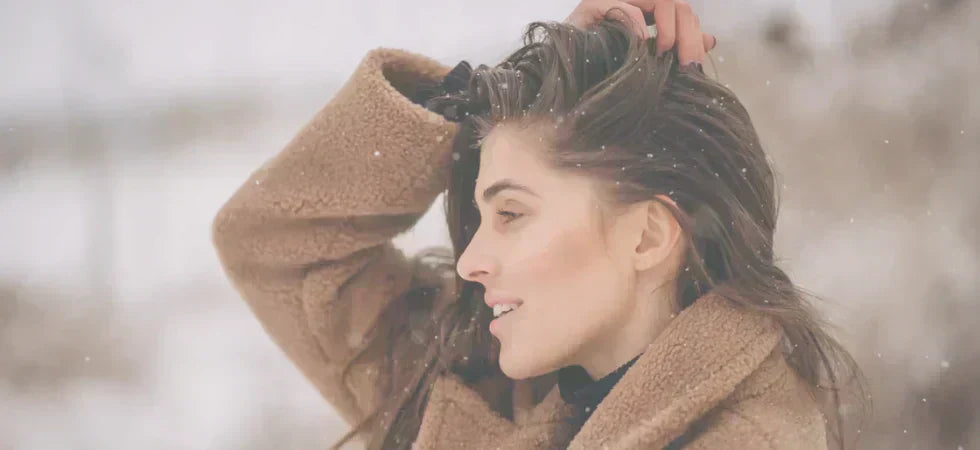How to prevent hair loss in winter?
Hair loss in winter is a natural phenomenon that affects many people. This hair growth cycle is often influenced by climate changes and external aggressors. Cold weather, dry air from heating, and a lack of nutrients can lead to seasonal hair loss. Fortunately, there are ways to limit these effects and preserve the health of your hair. In this article, we reveal all the keys to understanding the reasons for this hair loss and how to effectively address it.
Why is hair loss common in winter?
The effects of cold on the scalp
In winter, the cold slows blood circulation in the scalp. This reduced blood flow directly impacts hair growth. Hair follicles receive less oxygen and nutrients, weakening the roots and causing hair loss. Furthermore, the cold leads to a decrease in sebum production, a natural element that protects the scalp and hair from dehydration.
This situation makes hair drier, more brittle, and more vulnerable. The hair's life cycle, which includes phases of growth, rest, and shedding, can then be disrupted, intensifying hair loss during this period.

Impact of dry air and heating
Dry air caused by heating systems is another major factor in hair loss during winter. By drying out the indoor atmosphere, heating deprives the scalp of its natural moisture. Hair becomes more fragile, duller, and more prone to breakage.
Excessive use of a hairdryer during this season also contributes to dry hair. Add to that the temperature differences between heated indoors and cold outdoors, and the hair is subjected to an impact that can disrupt its natural cycle.

Seasonal changes and their influence on hair cycles
Seasonal changes strongly influence hair growth cycles. After autumn, when hair loss already peaks, winter prolongs this resting period for hair follicles. This is explained by the body's natural biological rhythm, which adapts to the seasons.
During this phase, the hair enters a resting phase to prepare for regrowth. This phenomenon is perfectly natural, but it can be accentuated by other factors such as stress, decreased sun exposure, or a lack of essential vitamins.
Tips to limit hair loss in winter
Adopt a suitable hair care routine
A suitable hair care routine is essential to limit hair loss. Start by choosing anti-hair loss products such as gentle shampoos, free of sulfates and parabens, which won't irritate your scalp. Use a moisturizing conditioner and regularly apply nourishing masks rich in fatty acids.
Brush your hair gently with a natural bristle brush to avoid damaging it. Reduce your use of the hairdryer. These simple steps protect your hair from external aggressors.
Maintain good scalp hydration
To prevent scalp dryness, opt for natural oils like coconut or argan oil, which are rich in essential fatty acids. Gently massage the scalp to stimulate blood circulation and nourish the roots.
Remember that hydration also comes from within. Drink at least 1.5 liters of water a day to maintain the health of your hair.
Protecting your hair from external damage
Wearing a wool/cotton hat helps protect hair from the cold. However, it's important to choose soft materials to avoid excessive friction. Alternate between days when you cover your hair and days when you let it breathe.

Diet and hair loss: what to prioritize in winter?
Essential nutrients for strong hair
Nutrition plays a central role in hair growth and regrowth. B vitamins, particularly B vitamins, as well as sulfur-containing amino acids, promote keratin production. Fatty acids and vitamin C are also essential for maintaining strong, shiny hair.
Examples of foods to include in your winter routine
Eat oily fish (salmon, mackerel, sardines) for their omega-3 content. Seafood such as oysters and shrimp are rich in zinc, a key element for preventing hair loss. Brewer's yeast, a natural source of B vitamins, is also ideal for strengthening your hair.
The importance of dietary supplements, if necessary
In cases of deficiencies, dietary supplements can be helpful. Formulas containing brewer's yeast, iron, or vitamins are often recommended. These supplements help regulate the hair growth cycle and prevent seasonal alopecia.
When should you consult a specialist?
Signs of excessive hair loss
If hair loss exceeds the average of 100 hairs per day, it's time to consult a doctor. Other signs, such as bald patches, an irritated scalp, or a lack of regrowth, should also raise concern.
Medical solutions and appropriate treatments
Treatments such as stimulating lotions or mesotherapy can reactivate hair growth. Medical examinations can also identify deficiencies or underlying diseases.
Role of dermatologists and trichologists
Many specialists, including dermatologists and trichologists, recommend a personalized approach to treating hair loss. According to Ludovic Rousseau, a renowned hair health expert, hair loss in winter shouldn't always be a cause for panic, as it's part of a natural life cycle. However, a consultation becomes essential when this hair loss intensifies or persists.
He also emphasizes the importance of combining simple actions, such as a balanced diet and appropriate care, to prevent seasonal hair changes.
Conclusion
Hair loss during the winter season is a natural phenomenon linked to the cold, seasonal changes, and other external factors. By adopting a suitable routine with anti-hair loss shampoos , you can preserve your hair.
FAQs about hair loss in winter
Which month is the most hair-losing month?
The decline reaches its peak in autumn and early winter.
When should you worry about hair loss?
If hair loss is excessive or regrowth is delayed, consult a specialist.
Is it the season for losing your hair?
Yes, seasonal changes, especially the transition from autumn to winter, disrupt the natural hair growth cycle. During these periods, hair enters a more resting phase, leading to seasonal hair loss. This is perfectly normal and results from climatic variations such as cold weather and reduced sunlight. However, with appropriate care, it is possible to minimize these effects.
What deficiency causes hair loss?
A lack of iron, vitamin B, or sulfur amino acids can cause hair loss.


